Roza Otunbayeva facts for kids
Quick facts for kids
Roza Otunbayeva
|
|
|---|---|
|
Роза Отунбаева
|
|
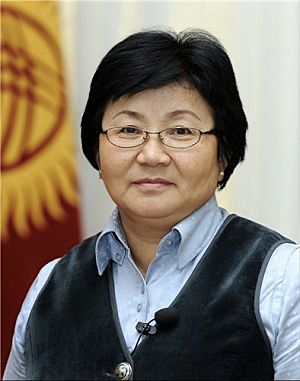
Otunbayeva in 2011
|
|
| 3rd President of Kyrgyzstan | |
| In office 3 July 2010 – 1 December 2011 Acting: 7 April 2010 – 3 July 2010 |
|
| Prime Minister | Almazbek Atambayev Omurbek Babanov (Acting) Almazbek Atambayev |
| Preceded by | Kurmanbek Bakiyev |
| Succeeded by | Almazbek Atambayev |
| Minister of Foreign Affairs | |
| In office 26 February 1992 – 10 October 1992 |
|
| Prime Minister | Tursunbek Chyngyshev |
| Preceded by | Muratbek Imanaliyev |
| Succeeded by | Ednan Karabayev |
| Kyrgyz Ambassador to the United Kingdom | |
| In office 1997–2002 |
|
| President | Askar Akayev |
| Deputy Prime Minister of the Kirghiz SSR | |
| In office 1986–1989 |
|
| President | Absamat Masaliyev |
| Preceded by | Jamal Tashibekova |
| Succeeded by | Zhanyl Tumenbayeva |
| Personal details | |
| Born | 23 August 1950 Frunze, Kirghiz SSR, USSR |
| Political party | Social Democratic Party |
| Spouse | Bolot Sadybakasov (divorced 1997) |
| Children | 3 |
| Alma mater | Moscow State University |
| Website | roza.kg |
Roza Isakovna Otunbayeva (born 23 August 1950) is a well-known politician and diplomat from Kyrgyzstan. She served as the President of Kyrgyzstan from 2010 to 2011. This made her the first female head of state in Central Asia. She became president after a big change in government in 2010. Before that, she was the Minister of Foreign Affairs and a leader in the Social Democratic Party of Kyrgyzstan.
Since 2022, Otunbayeva has been working for the United Nations. She is the Special Representative for Afghanistan and leads the United Nations Assistance Mission in Afghanistan (UNAMA).
Contents
Early Life and Education
Roza Otunbayeva was born in Frunze (which is now Bishkek, the capital of Kyrgyzstan). Her father was a judge, and her mother was a teacher. She studied philosophy at Moscow State University and graduated in 1972. After that, she taught philosophy at Kyrgyz State National University for six years.
In 1975, she earned a higher degree (like a PhD) after writing about different ideas in philosophy.
Otunbayeva has two children. She can speak several languages, including Russian, English, German, French, and Kyrgyz.
Political Journey
Roza Otunbayeva started her political career in 1981 with the Communist Party. She held various important roles in the government of the Kirghiz Soviet Socialist Republic. In 1986, she became the Deputy to the Chairman of the Council of Ministers and also the Minister of Foreign Affairs.
From 1989 to 1992, she worked with UNESCO, an organization that promotes education, science, and culture around the world.
Roles in Independent Kyrgyzstan
After Kyrgyzstan became an independent country in 1992, she continued to serve in important roles. She was the Minister of Foreign Affairs and Deputy Prime Minister. Later, she became Kyrgyzstan's first ambassador to the United States and Canada. She also served as ambassador to the United Kingdom.
From 2002 to 2004, she worked for the United Nations in a peacekeeping mission in Georgia. When she returned to Kyrgyzstan in 2004, she became very active in politics. She helped start a political movement called Ata-Jurt (Fatherland).
The Tulip Revolution
Otunbayeva was a key leader in the Tulip Revolution in 2005. This was a major event that led to a change in Kyrgyzstan's leadership. After this revolution, she briefly served as the Acting Foreign Minister.
She continued to be involved in politics, pushing for a new democratic constitution in 2006. In 2007, she was elected to the Jogorku Kenesh, which is the Parliament of Kyrgyzstan. She led the opposition Social Democratic Party from 2008 to 2010.
Becoming President in 2010
On April 7, 2010, after widespread protests, Roza Otunbayeva was chosen by opposition leaders to lead an interim government. The previous president, Kurmanbek Bakiyev, left the country.
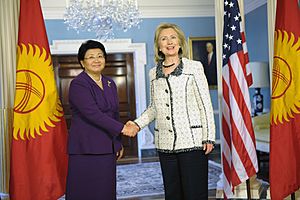
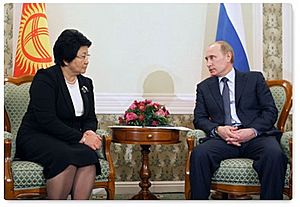
As the interim president, Otunbayeva worked to stabilize the country. She announced that new elections would be held. On July 3, 2010, she was officially sworn in as president after a public vote (referendum) on a new constitution. This new constitution changed Kyrgyzstan from a presidential system to a parliamentary system. This meant that the parliament would have more power.
Her term as president ended on December 31, 2011, as the new constitution did not allow her to run in the next presidential election.
Challenges During Her Presidency
During her time as president, Kyrgyzstan faced some difficult challenges. In June 2010, there were conflicts in southern Kyrgyzstan. These events led to many people losing their homes.
Her government faced criticism regarding how it handled these events and for not preventing the unrest. Human rights groups also raised concerns about the treatment of some individuals arrested during this period.
Concerns for Human Rights
During this time, a human rights activist named Azimzhan Askarov was arrested. He had been filming events during the unrest. There were concerns raised by human rights groups about his trial and treatment.
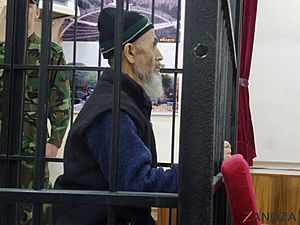
International organizations noted that there were issues with the investigation and trials related to the 2010 events.
After the Presidency
In January 2012, after her presidency, Otunbayeva started the "Roza Otunbayeva Initiative" Foundation. This foundation works on projects to help Kyrgyzstan develop socially, politically, and economically.
She continues to be an important voice in discussions about freedom and democracy. In 2018, she said that young people in Kyrgyzstan really value their freedom.
Awards and Recognition
Roza Otunbayeva has received many honors for her work. Newsweek magazine listed her as one of the 150 Most Influential Women in the World in 2011.
She has received France's "Legion of Honour" Award and Mongolia's "Polar Star" Award. She also received the Premio Minerva Medallion from Italy for her leadership and work promoting democracy and peace.
In 2011, the United States Department of State gave her an International Women of Courage Award. This award recognizes women who show great leadership, courage, and a willingness to help others, especially in promoting women's rights. In 2012, the Eurasia Foundation also honored her for her leadership during Kyrgyzstan's change in government.
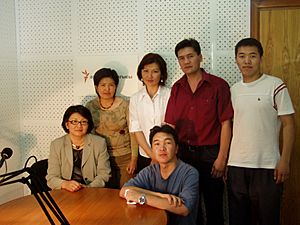
Otunbayeva is a member of several important international groups, including the Club of Madrid and the Leadership Council of the Sustainable Development Solutions Network, which is a global initiative of the United Nations. She is also an Honorary Professor at several universities in China, Azerbaijan, and Kyrgyzstan.
See also
 In Spanish: Roza Otunbáyeva para niños
In Spanish: Roza Otunbáyeva para niños
 | Laphonza Butler |
 | Daisy Bates |
 | Elizabeth Piper Ensley |

